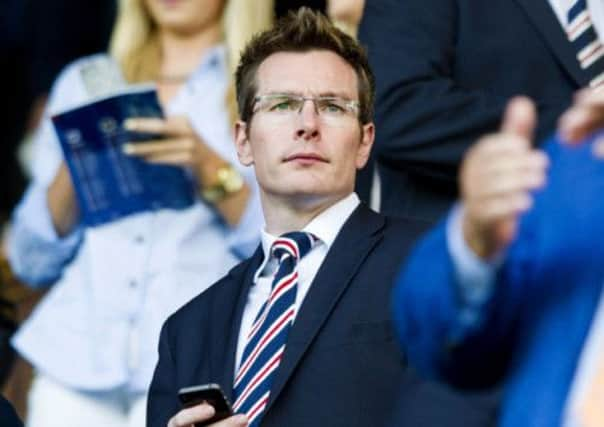Glenn Gibbons: Rangers drift into dangerous waters


Rather than alarm, however, these events seem to have triggered among the club’s supporters a groundswell of hope that the listing old vessel will now fall into the hands of salvage experts.
There appears to be no shortage of willing saviours (at least, of the type who will do anything to effect a rescue as long as it does not involve offering financial aid), but in the past two years the place has been infested with would-be idols who proved to have feet of clay; there have been enough, surely, to warrant a circumspect, rather than celebratory reception to the next one (or group) to climb aboard.
Advertisement
Hide AdAdvertisement
Hide AdWith only finance director Brian Stockbridge and non-exec James Easdale occupying seats, Rangers no longer have a properly-constituted board, and co-options are needed in a hurry. That prospective haste, with its built-in risk of unsuitable or inappropriate appointments, could, in itself, be a reason for apprehension among the laity.
The latter, after all, have had to endure a stream of so-called “directors” who have exhibited a breathtaking ignorance of stock market regulations. In certain instances, of course, breaches of the rules have been less attributable to naivety than to an outrageous readiness to drive a horse and cart through them.
In the past fortnight alone, there have been enough violations of confidentiality laws to prompt an investigation by Stock Exchange commissioners. There have been rumours that such a probe is in the offing and, while they remain simply gossip, they are hardly surprising.
However fiercely supporters (or even shareholders) may clamour for transparency and clarity, it is not achievable if the information involved is likely to impact on the share price.
Just last week, it was reported that the man in charge of the kitty, Stockbridge, had told a fans’ group that Rangers would be down to their last £1 million by April. As market-sensitive revelations go, this one could have sent the stock through the floor.
That stick of dynamite was soon followed by the well-publicised tale of Mather’s trip to South Africa for talks with Dave King with a view to installing the Glasgow-born entrepreneur as the club’s next chairman. The least surprising aspect of this story was its consequence, an official retraction on Rangers’ website, ordered by the company’s nominated adviser (NOMAD), Daniel Stewart.
The most ludicrous – indeed, scandalous – point of the indiscretions, and a series of others throughout the short history of The Rangers International Football Club plc is that no director, from the chairman and chief executive down, appears to have been aware of their illegitimacy, or had the power – or the authority – to prevent them.
Strachan rekindles desire to wear dark blue
Of ALL the inferences to be drawn from Scotland’s impressively comprehensive defeat of Croatia, perhaps the most encouraging and gratifying is the high probability that Gordon Strachan’s management style is entirely suited to the national team.
Advertisement
Hide AdAdvertisement
Hide AdThis likelihood is of potentially enormous significance, as there has been, down through the decades, enough (sometimes painful) examples of the differences between club football and the international game to lend immeasurable value to the work of anyone who proves to be a specialist. In Strachan’s case, the on-field evidence is rapidly mounting, and is reinforced by reference to his singular personality.
It is no insult to claim that he is suffused with a natural abrasiveness, a characteristic that informs much of what he does, and is certainly central to his work. Media representatives are frequently discomforted by his irascibility and sarcasm (in some instances, outright hostility) in the course of press conferences. They are also familiar with stories of altercations with others, such as players, and even fans.
Yet the group presently operating under the national banner are unmistakably happy in their work, exhibiting a commitment and industriousness that had certainly been mislaid under some of Strachan’s predecessors, such as Craig Levein, George Burley and Berti Vogts.
It seems legitimate to speculate that, in the limited preparation time available to an international manager with his squad – and the fact that they are not “his” players – Strachan has more urgent priorities than seeking or attracting confrontation.
The primary distinction between the Scots and the Croats at Hampden Park on Tuesday was unmissable: the winners evinced an ebullient willingness, the losers a sense of indifference that was shocking in a team at No 8 in the Fifa world rankings. These peculiarities are nothing other than managerial fingerprints, betraying the identity and the philosophy of the man in charge.
Despite the fact that, as Strachan himself said, Scotland’s 2-0 victory “did not mean a thing”, while Croatia’s defeat took them into the World Cup play-offs, it was his rival, Igor Stimac, clearly distressed by the derision of his countrymen, who resigned his commission.
While the general acclaim for Scotland’s previous victory over the lowly-ranked Macedonia was excessive to the point of ludicrousness, this latest exercise merited all the credit that came its way. The players have not suddenly improved beyond recognition, but Strachan has clearly followed the route taken earlier by Walter Smith and tried immediately to create a climate which would revitalise any player’s waning desire to pull on the dark blue shirt.
He has also simplified tactical instructions, complying with his known strategy at Celtic of not “spooking” his players by filling their heads with too much information. And he is, of course, an obsessive for hard work. In the matter of auditioning for a place in a Strachan team, slackers need not apply.